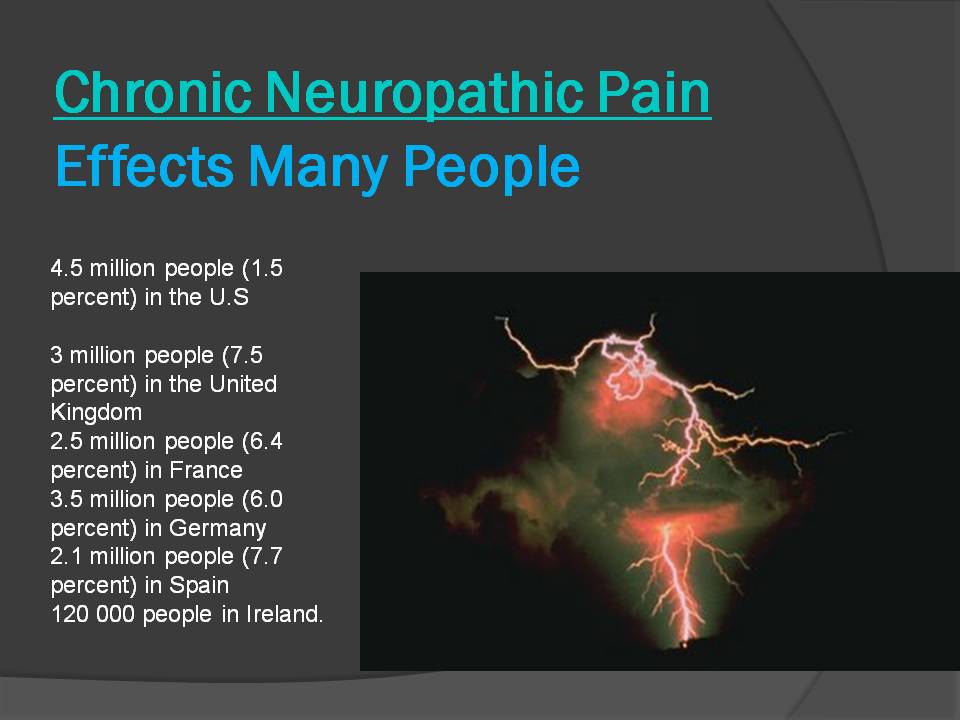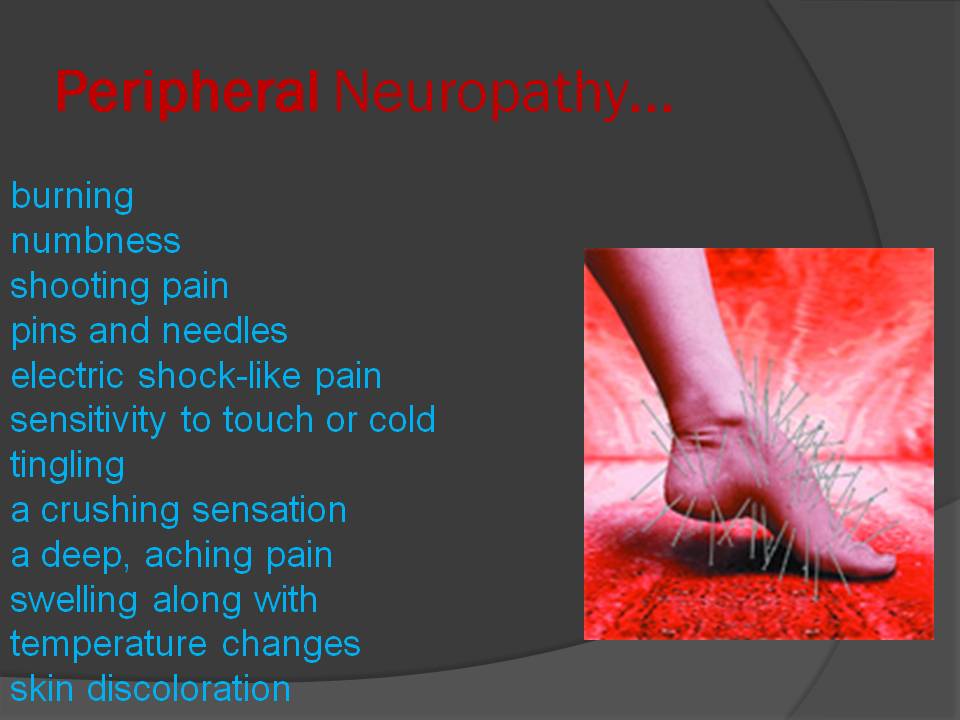|
|
Types Of NeuropathyNeuropathyDR of Tucson and DR J.L. Greer D.C. local chiropractor offers the highest quality of Neuropathy Care on the market today. Since 1992, we have provided superior service to our customers and have assisted them in achieving their goals. Our years of experience and commitment to excellence have earned us the reputation as one of the best neuropathy care centers in the area. If your suffering with any of these symptoms: Pain, Pins & Needles, Stabbing, Electrical Shocks, Plantar Fascist in the Feet / Foot, Legs, Hands and Arms. Call 520-733-1172 |
|||||||||||||||
 |
|||||||||||||||
 |
 |
||||||||||||||
|
pain. Types of Peripheral Neuropathy There are several kinds of peripheral neuropathy that stem from a variety of causes. They range from carpal tunnel syndrome (an injury common after chronic repetitive use of the hands and wrists, such as computer use) to Guillain-Barre syndrome (a rare, sudden paralysis). As a group, peripheral neuropathies are common, especially among people over the age of 55. All together, the conditions affect many people in this group. Neuropathies are typically classified according to the problems they cause or what is at the root of the damage. There also are terms that express how extensively the nerves have been damaged. Mononeuropathy Damage to a single peripheral nerve is called mononeuropathy. Physical injury or trauma such as from an accident is the most common cause. Prolonged pressure on a nerve, caused by extended periods of being sedentary (such as sitting in a wheelchair or lying in bed), or continuous, repetitive motions, can trigger mononeuropathy. If the fibrous, shock-absorbing discs that lie between the bones in the back are damaged, they could press on a nerve and cause this type of neuropathy. Carpal tunnel syndrome is a common type of mononeuropathy. It is called an overuse strain injury, which occurs when the nerve that extends through the wrist is compressed. People whose work requires repeated motions with the wrist extended (such as assembly-line workers, physical laborers, and those who use computer keyboards for prolonged periods) are at greater risk. The damage to the nerve can result in numbness, tingling, unusual sensations, and pain in the first three fingers on the thumb side of the hand, particularly while sleeping. In time, carpal tunnel injuries can weaken the muscles in the hand. You may also feel pain, tingling, or burning in your arm and shoulder. Here are examples of other mononeuropathies that can cause weakness in the affected parts of the body, such as hands and feet:
Polyneuropathy Polyneuropathy accounts for the greatest number of peripheral neuropathy cases. It occurs when many peripheral nerves throughout the body malfunction at the same time. Polyneuropathy can have a wide variety of causes, including exposure to certain toxins, poor nutrition (particularly vitamin B deficiency), and complications from diseases such as cancer or kidney failure. One of the most common forms of chronic polyneuropathy is diabetic neuropathy, a condition that occurs in people with diabetes. It is the result of poorly controlled blood sugar levels. Though less common, diabetes can also cause mononeuropathy, often characterized by weakness of the eye or of the thigh muscles. These are the most common symptoms of polyneuropathy:
Joints are particularly vulnerable to stress in people with polyneuropathy because they are often insensitive to pain. One of the most serious polyneuropathies is Guillain-Barre syndrome, a rare disease that strikes suddenly when the body's immune system attacks nerves in the body. Symptoms tend to appear quickly and worsen rapidly, sometimes leading to paralysis. Early symptoms include weakness, tingling, and loss of sensation in the legs that eventually spreads to the arms. Blood pressure problems, heart rhythm problems, and breathing difficulty may occur in critical cases. However, despite the severity of the disease, recovery rates are good when patients receive treatment early.
|
|||||||||||||||
|
How are the peripheral neuropathies classified? More than 100 types of peripheral neuropathy have been identified, each with its own characteristic set of symptoms, pattern of development, and prognosis. Impaired function and symptoms depend on the type of nerves-motor, sensory, or autonomic-that are damaged. Motor nerves control movements of all muscles under conscious control, such as those used for walking, grasping things, or talking. Sensory nerves transmit information about sensory experiences, such as the feeling of a light touch or the pain resulting from a cut. Autonomic nerves regulate biological activities that people do not control consciously, such as breathing, digesting food, and heart and gland functions. Although some neuropathies may affect all three types of nerves, others primarily affect one or two types. Therefore, doctors may use terms such as predominantly motor neuropathy, predominantly sensory neuropathy, sensory-motor neuropathy, or autonomic neuropathy to describe a patient's condition.
|
|||||||||||||||
Our ValuesLeadership: At NeuropathyDR of Tucson, you receive the kind of quality and service you expect from a leader. Our company is always evolving as the needs or our customers change and as new treatments are created in the market. You can rest assured that, working with NeuropathyDR of Tucson, you will enjoy the latest services, technology and developments in the industry. Customer Relations: At NeuropathyDR of Tucson, our highest priority is satisfied customers. You are important to us and you can expect us to go the extra mile for your business. Superior customer service is the hallmark of NeuropathyDR of Tucson. We are proud to serve you and work hard to earn your business. |
|||||||||||||||
|
Statements about neuropathy and others topics are for information only and should not in any way be used as a substitute for the advice of a physician or other licensed health care practitioner. Suggestions and ideas presented here should not be interpreted as medical advice, meant for diagnosing illness, or for prescriptive purposes. |
|||||||||||||||
|






